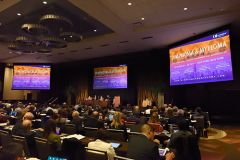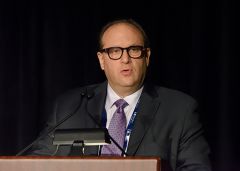
Since its inception in 2000, the Lymphoma and Myeloma Congress has grown to include attendees from over 40 countries. The Congress is the premier forum on the latest advances in lymphoma, myeloma and related plasma cell disorders. This year, the Congress utilized a dynamic approach that featured clinical controversies, debates, and interesting lectures involving conversations around current treatment regimens as well as promising treatments in the development pipeline.Approximately 1,000 hematologists, oncologists, and other healthcare professionals from across the globe came together for the annual Lymphoma and Myeloma Congress in New York City from October 26 â 28, 2017.
Dr. Ruben Niesvizky, Director at the Weill Cornell Myeloma Center, co-chaired the myeloma session and acted as moderator at this yearâs Lymphoma and Myeloma Congress. Many other physicians from the Weill Cornell Medicine and NewYork-Presbyterian Myeloma Center, including Dr. Adriana Rossi, Associate Clinical Director at the Weill Cornell Myeloma Center, presented on promising agents for patients with relapsed or refractory myeloma. For example, Dr. Rossi highlighted clinical data that led to the Food and Drug Administration (FDA)- approval of an immunomodulatory drug (IMiD), lenalidomide (Revlimid), which has significantly improved overall survival in myeloma, although toxicity remains an issue for certain patients.

Dr. Roger N. Pearse, medical oncologist at the Weill Cornell Myeloma Center, moderated the last debate of the day on the topic of bisphosphonates versus monoclonal antibodies in the treatment of myeloma. Bisphosphonates (e.g. aredia and zometa) have a long track-record (dating back to the 1960's and in 1990, the mechanism of action was identified) of providing positive clinical outcomes for patients whereas monoclonal antibodies (e.g. elotuzumab and daratumumab), were more recently FDA-approved in 2015. Arguments for and against each drug class primarily focused on potential side effects. Presenters noted that the use of bisphosphonates can cause pain and infection in the jaw, leading to osteonecrosis of the jaw (ONJ), which is when part of the jaw bone dies. Adverse events that occur when taking monoclonal antibodies are often related to allergic-type infusion reactions.Dr. Cara Rosenbaum, medical oncologist specializing in myeloma, amyloid and other plasma cell disorders, also played an integral role at the Congress, acting as moderator for a discussion surrounding the role of allogeneic transplant in young, fit myeloma patients. Arguments in favor of transplant were based on the high complete response (CR) rates seen in clinical trial results. One of the benefits of allogeneic transplant is that because the patient is receiving cells from an outside donorâs immune system, those cells may get rid of the myeloma more effectively than the patientâs own immune cells. The argument against allogeneic transplant for myeloma patients was focused on the potential complication known as graft-versus-host disease (GVHD), which occurs when the donor cells attack the patient cells. While this is usually a treatable disease, it should be taken into consideration when deciding whether allogeneic stem cell transplantation is an appropriate treatment option.Over 40 key opinion leaders and subject matter experts, many of whom are physicians at Weill Cornell Medicine and NewYork-Presbyterian, were invited to speak and share updates on developments that have the potential to lead to improved patient care.
In addition to the General Session at this yearâs Congress, a concurrent track was offered specifically to meet the educational needs of nurses and advanced practitioners who treat lymphoma and myeloma. Weill Cornell Medicine/NewYork-Presbyterian nurses and physician assistants presented on treatment updates as part of this track. Jeremy T. Heinerich, Chief Physician Assistant of the Inpatient Service at Weill Cornell Medicine/NewYork-Presbyterian, was the session chair of the morning lecture series âUpdates in Hematology.â Arthur Perry, a physician assistant at the Weill Cornell Medicine/NewYork-Presbyterian Myeloma Center, presented on myeloma treatment updates. He shared some of the clinical trial results that led to the FDA-approval of newer monoclonal antibody myeloma treatments such as daratumumab (Darzalex) and elotuzumab (Empliciti). He also reviewed the clinical trial data that led to the approval of proteasome inhibitor, ixazomib (Ninlaro). Jeremy Heinerich, PA concluded this track with a presentation and demonstration on practical tips for bone marrow biopsies and lumbar punctures.
Outside of the conference room, Weill Cornell Medicine/NewYork-Presbyterian hosted an exhibit table, among other non-profit organizations and pharmaceutical companies, and distributed educational information about our cancer care services offered by our Hematology and Oncology Division, as well as open clinical trials through our Joint Clinical Trials Office (JCTO).
Learn more about the scientific agenda of this yearâs Lymphoma and Myeloma Congress here.

